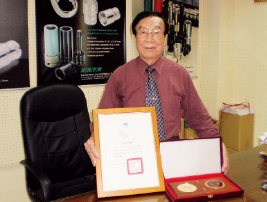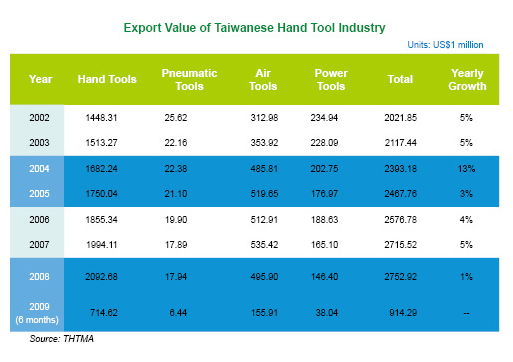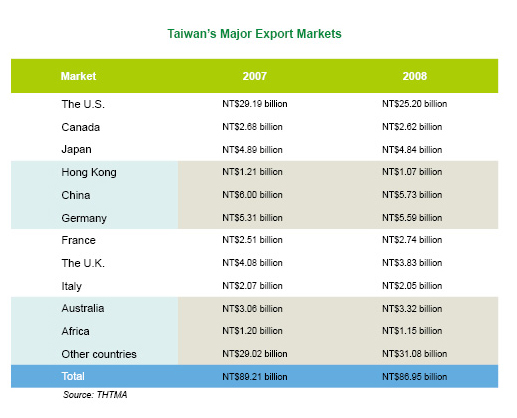THTMA Chairman M.C. Cheng Sheds Light on Upgrading of Hand-tool Sector
2010/01/13 | By Steve ChuangOne can debate whether being nominated the chairman of the THTMA (Taiwan Hand Tool Manufacturers' Association) in September 2007 obliged M.C. Cheng, also chairman of Horniton Industries Inc., a Taiwan-based supplier of sockets and auto repair tools with a private brand, to devote more time and effort to better growth and development of the hand tool sector in Taiwan at the expense of self-interest, or has heading the trade association been mostly a feather in Cheng's cap?

With his three-year chairmanship at the THTMA to end next September, Cheng, in this interview with CENS, talks about the present and future of the sector, as well as the association's work to date to sharpen the suppliers in Taiwan to cope with tougher competition and more stringent demand globally.
China Prevails by Dumping
Taiwan had been renowned as the "Kingdom of Hand Tool" for decades in export volume, until China emerged to exceed the island globally by dumping-flooding markets with low-end DIY tools at prices only achievable by the countless laborers in China paid a fraction of their counterparts in more developed markets-to boost market shares since 2003, says Cheng.
Taiwan exported mainly four major lines-hand tools, power tools, pneumatic tools and hydraulic tools-valued at US$2.75 billion in 2008, while China exported US$11.84 billion, says Cheng and the gap is widening, forcing Taiwan-based hand tool makers to all but forsake DIY and low-end tools to look for greener pastures. "We urgently need to build a so-called value-chain, especially when competitors from East Europe and Southeast Asia are catching up fast."
Meanwhile, the hand tool sector in Taiwan has been virtually knocked off its feet by the global meltdown that has sapped available financing to cripple many industries as well as consumer spending. "The suppliers in Taiwan have seen export values on a steady downtrend over the past nine months since the fourth quarter of 2008," Cheng says. "We even saw production volume clipped by half in the first quarter."
Despite slowing rate of decline, Taiwan's hand tool export value for the first half of the year still plummeted 29% to only NT$30.7 billion (about US$945 million) from NT$43.3 billion (US$1.33 billion) of a year earlier. "In all honesty, the export value for this year is very likely to drop by the same level due to appreciation of the New Taiwan dollar and China Steel Corp.'s move to raise prices of chrome vanadium steel, not to mention economic uncertainty next year," says Cheng.

Dulling Competitiveness
Adding fuel to fire is that Taiwan-based makers' competitiveness in Asia may further be compromised by the upcoming formation of the AFTA (Association of Southeast Asian Nations Free Trade Area) within ASEAN + 3 nations (China, Japan and South Korea), says Cheng, mainly because Taiwan is barred from the AFTA, which will impose a 5-10% tariff to further dilute any price advantage of Taiwan-made tools relative to those from Japan and South Korea. "Although some Taiwan-based makers are planning to build factories in Southeast Asia to avoid such tariffs; but the ripple effect will shudder the whole sector, even forcing out small operators who lack sufficient resources to stay in the game," says Cheng.
More dark clouds take the form of possibly outsourcing production to Southeast Asian countries, for these countries often lack skilled labor to handle key processing as non-toxic electroplating and heat treatment, Cheng warns based on personal experience. As a member of the group, led by M.Y. Ho, Taiwan's ex-minister of economic affairs from 2004 to 2006, of globally-competitive Taiwan-based makers to visit manufacturers in the Philippines and Vietnam several years ago, Cheng saw why moving production to those nations comes with a hefty price. "Taiwan-based suppliers would be trading time-tested reputation for quality tools for low-end prices, in the process giving up years of hard work."

Move Upmarket
Despite the threatening scenarios painted so far, Cheng says that hope lies ahead as long as hand tool makers in Taiwan work more closely with each other to move upmarket, backed by the THTMA and government.
Cheng urges Taiwan-based OEM (original equipment manufacturers) and ODM (original design manufacturers) to devote more effort to become OBM (original brand manufacturer), a way to achieve better margins and, above all, sustainable business development. Citing his own example as a successful OBM, Cheng says the Horniton brand has enabled his firm to control its export decline at only 10-15% in the first half of the year, far better than the 29% industry average." Horniton-branded sockets and auto repair tool sets are popular with professionals in Europe and the U.S.
Realizing successful branding is a costly, tough journey that may take years to undertake, Cheng has labored to persuade the government to focus financial backing of the THTMA to enable the association to effectively leverage every cent in the budget. Without political-correctness, Cheng sums up a perennial picture of official efforts to help industry: "Bureaucrats often waste subsidizing corporate R&D, branding and participation in global exhibitions, simply because officials often don't know what is happening in the industry, and being paper-pushers behind big desks who spout grandiose platitudes will not change such situation. On the contrary, the THTMA is the right person for the job. After all we work in the industry and can, based on our first-hand knowledge of member firms, direct resources to problems as necessary. In essence, the THTMA can help more resource-limited but truly capable companies to upgrade by developing private brands."
Also Taiwan-based makers, especially ones with excellent ODM capability, should participate in more global exhibitions to build higher profile and capability, says Cheng. "In fact the THTMA has been actively working with the Bureau of Foreign Trade to encourage local makers to participate in key international exhibitions, with many having been helped to raise global presence and build new contacts throughout last year. That's why the industry has maintained 1.5% export growth last year despite the downturn."
Furthermore the THTMA has also been a proponent of the national pavilion at global exhibitions. "We set criteria to qualify only the best makers from Taiwan to show quality products in such pavilions. The collective effort works very well. For instance, the Taiwan pavilion at the 2008 National Hardware Show in the U.S. showcased a host of the best Taiwan-made tools to effectively impress global buyers with a quality-oriented image," says Cheng.
Industrial Upgrading
To help take hand tool makers in Taiwan into the e-age of management, the THTMA has also been promoting e-management tools, according to Cheng. The fact is that the e-management pill may be bitter but has to be swallowed, which is especially tough since many Taiwan-based hand tool makers are SMEs (small and medium-sized enterprises) lacking sufficient resources and thorough know-how of computer-aided management tools. Such high hurdle is being cleared with the MOEA proposing a project to raise traditional SMEs' core competence, so the THTMA has been helping members to introduce e-management tools into their organizations.

"In addition, we've also promoted cross-industry alliance to help insiders learn different concepts of business development to popularize e-management in the industry," says Cheng.
Finally and supporting the Chinese National Federation of Industries' plan to facilitate government-to-industry communications, the THTMA has moved to build a feedback window, one that allows industry and insiders to quickly report real-life situations and difficulties to authorities so the government can offer help as necessary, according to Cheng.




